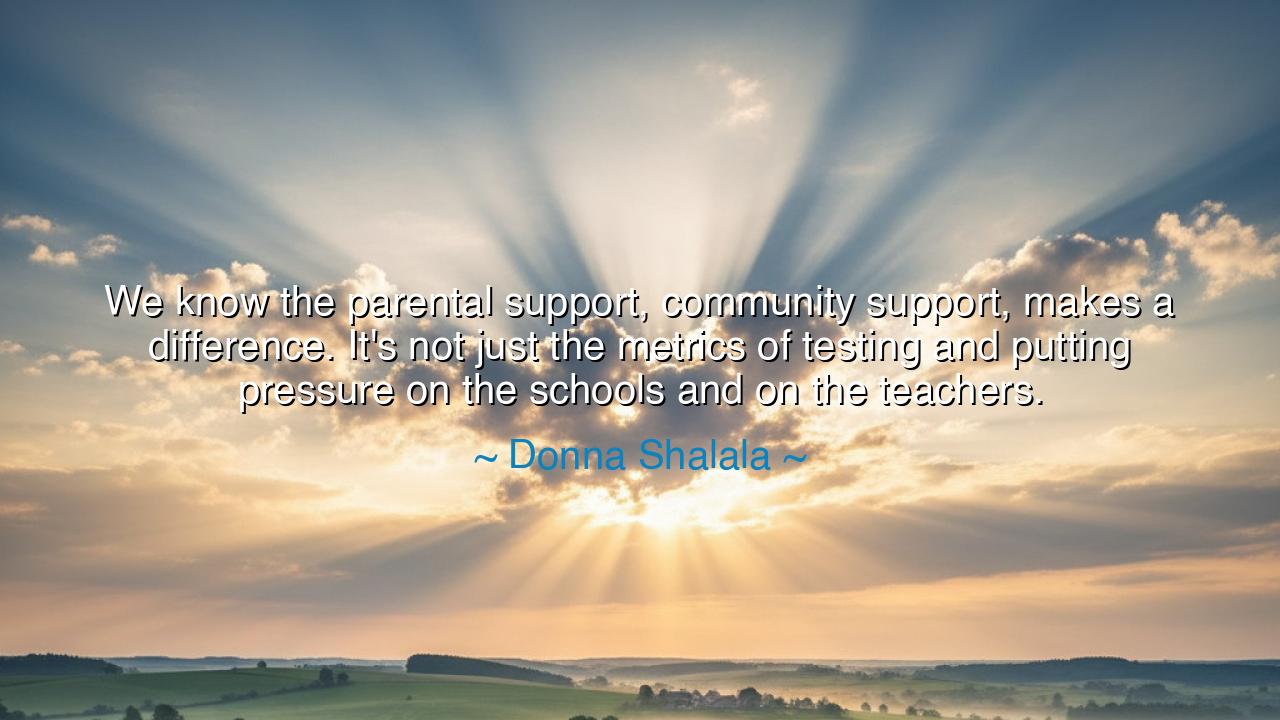
We know the parental support, community support, makes a
We know the parental support, community support, makes a difference. It's not just the metrics of testing and putting pressure on the schools and on the teachers.






Hearken, children of the ages, and attend to the words of Donna Shalala, who spoke with the clarity of one who has witnessed the workings of human communities: "We know the parental support, community support, makes a difference. It's not just the metrics of testing and putting pressure on the schools and on the teachers." Herein lies a meditation upon the intertwined forces of family, society, and education, and the profound truth that the nurturing of young minds depends as much upon human connection as it does upon abstract measures of performance.
In these words, parental support emerges as a foundational pillar. When parents engage with the lives of their children, offering guidance, encouragement, and care, they instill not only knowledge but confidence, resilience, and curiosity. Shalala reminds us that the growth of the learner is inseparable from the support that surrounds them, and that the metrics of testing, though useful, cannot substitute for love, attention, and presence.
Consider the historical example of Malala Yousafzai, whose father’s unwavering support nurtured her courage and commitment to education in the face of grave danger. It was not standardized testing nor institutional pressure, but familial and community encouragement that enabled her to rise and advocate for the education of countless others. Shalala’s observation reflects this universal truth: parental and communal support is a force that multiplies the efficacy of all formal education.
Community support is equally vital. A society that values learning, mentors the young, and celebrates growth provides a fertile environment for children to flourish. Shalala teaches that schools and teachers, though central, operate within a larger ecosystem. The nurturing of young minds requires the collaboration of all: parents, neighbors, mentors, and civic leaders, whose collective encouragement reinforces lessons, fosters responsibility, and cultivates a sense of belonging.
The warning against reliance solely on metrics of testing and pressure highlights the danger of reducing education to mere numbers. Knowledge without context, curiosity without encouragement, and discipline without empathy can produce compliance but not wisdom. Shalala’s insight reminds us that children are not vessels to be measured, but lives to be guided, inspired, and nurtured, and that learning flourishes most where support and human connection are present.
Consider the life of Booker T. Washington, who overcame adversity through the support of family, community, and mentors. The encouragement he received at home and in his early schools empowered him to educate himself, uplift others, and ultimately transform institutions. His life illustrates Shalala’s point: metrics and standards alone cannot achieve transformation; support, care, and mentorship are indispensable.
The lesson is profound: invest in parental and community support, recognizing that the growth of the learner depends on more than academic measures. Attend to the hearts, minds, and spirits of children, providing encouragement, guidance, and affirmation. Understand that the pressures of standardized tests or institutional demands cannot replace the nourishing effects of love, attention, and communal care.
Practical action follows naturally: engage with children beyond their academic work, participate in their schools, mentor, volunteer, and create networks of encouragement. Celebrate effort, curiosity, and integrity, not just grades or performance metrics. Build a community in which support uplifts both teachers and learners, for it is in such a network that education becomes transformative, holistic, and enduring.
Thus, Donna Shalala’s words endure as both guidance and revelation: parental support and community support are forces that shape learning more profoundly than pressure and tests alone. Let all who hear remember that the cultivation of young minds is a sacred partnership, requiring care, connection, and the enduring presence of those who nurture, inspire, and believe.
If you wish, I can also craft a poetic, audio-ready version of this passage, where the cadence mirrors the rhythm of teaching, support, and community, enhancing the emotional and reflective resonance of Shalala’s insight. Do you want me to do that?






AAdministratorAdministrator
Welcome, honored guests. Please leave a comment, we will respond soon